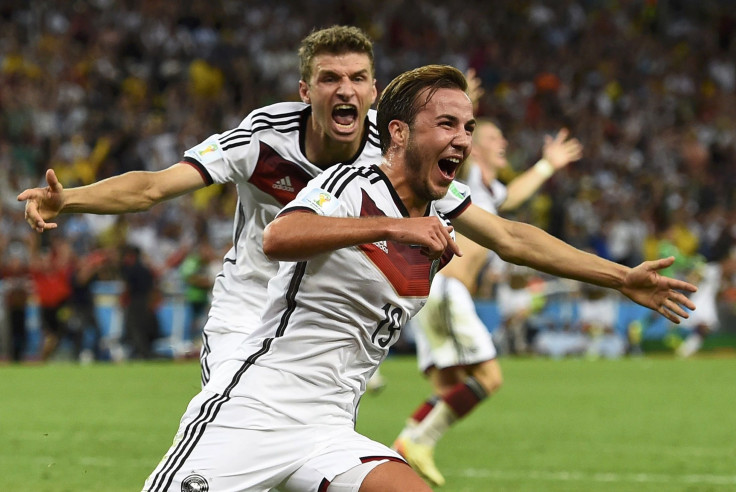World Cup 2014 Shatters US Viewing Records; Can Fox Continue ESPN’s Progress In 2018?

At the climax of a World Cup that saw viewing records eclipsed on an almost daily basis, Sunday’s final between Germany and Argentina comfortably became the most-watched soccer game in the history of the United States, with an average of nearly 30 million viewers.
The final in Brazil, which Germany won 1-0 in extra time, was viewed by an average 17.3 million people on ABC -- together with 1.8 million on ESPN’s online streaming service WatchESPN. In addition, the Spanish-language broadcast of the finale at Rio de Janeiro’s famed Maracanã stadium averaged 9.2 million viewers on Univision, with an additional 450,000 fans watching via the network’s online app.
Neither network individually set a viewership record, with the highest-rated games on ABC/ESPN the U.S.-Portugal match in this summer’s World Cup and the 1999 Women’s World Cup final, while Univision’s remains the 2014 Mexico-Netherlands Round of 16 game. But the overall trend continues to skyrocket. Just 14 years ago, the World Cup’s 64 matches averaged a million viewers, then more than doubled four years later, before reaching 3.3 million in 2010. That number has now increased 33 percent to 4.6 million, helped by kick off times in Brazil favorable to U.S. viewers.
Those figures don’t even include the numerous large-scale viewing parties that became a trend during the past four weeks, in growing evidence of soccer breaking out of the niche sports market and into the mainstream. Rather than an out-of-the-blue explosion during this World Cup, the growth has been steady, helped by the improvement in the domestic Major League Soccer as well as NBC’s impressive commitment to English Premier League coverage over the past year.
Still, while soccer is surely here to stay as a major sporting force in the U.S., there are major challenges for the record viewing figures in 2014 to even be matched when the 2018 edition rolls around in Russia. The most obvious of these is the time difference. A game kicking off at 3 p.m. in Moscow would get underway at 7 a.m. on the East Coast and 4 a.m. on the West Coast. Hardly ideal hours to get hyped up for a sporting event, never mind holding the types of mass public gathering that have done so much to fuel the fervor around the U.S. over recent weeks.
And then there's this: the World Cup is leaving ESPN to become the property of Fox, after the network paid $425 million for the rights over the next eight years. It's a move that has already bred concern among many soccer fans. ESPN has dedicated unprecedented hours of coverage to the World Cup outside simply showing the games, both with primetime analysis shows each evening and heavy cross-platform promotion of the event.
The big question for skeptical soccer fans is whether Fox will now do the same. While ESPN’s coverage has excelled by appealing to soccer diehards in the confidence that those new to the sport will come along for the ride, Fox has a history of doing just the opposite.
Fox is only three years removed from having a pregame segment of the biggest club game on the planet, the Champions League final, featuring former New York Giants defensive end, Michael Strahan, explaining how the rest of the world’s version of football was different from the NFL. On more than one occasion, the network's coverage has also featured analysis from recently axed CNN anchor and former British tabloid editor, Piers Morgan.
Fox's most controversial strategy came when thrusting college basketball announcer Gus Johnson into the role of their lead soccer voice with the 2018 World Cup in mind. ESPN tried something similar when featuring baseball caller Dave O’Brien on its coverage for the 2006 World Cup. The torrent of abuse was such that ESPN has since utilized almost exclusively British play-by-play announcers. Fox is adamant that its wants an American voice at the heart of the network's soccer coverage, but the decision to utilize one who has needed a crash course in soccer culture, rather than one of the many long-standing American soccer callers, has earned considerable criticism on online forums and on Twitter.
Johnson hasn't been helped by his colleagues, thus far. In contrast to the in-depth analysis provided by ESPN’s revolving group of experts, Fox has tended to take a more light-entertainment stance to its coverage. For the Gold Cup Final last year between the U.S. and Panama, analyst and former U.S. international, Eric Wynalda, included among his three keys to the game the tidbit, “Have some fun.” Such comments now seem jarring when compared with the giant strides taken by both ESPN and NBC in recent years.
Viewing figures could also be hurt by Fox Sports' current lack of a streaming service to match WatchESPN. Fox’s soccer coverage has so far been made available online via Fox Soccer 2Go, but unlike ESPN’s service, it has required viewers pay either $20 for a rolling monthly subscription, or get a 12-month subscription for $140. Last year, Fox Sports launched a new free streaming platform, Fox Sports Go, but it still lacks the reach of its ESPN counterpart.
After the phenomenal success of the 2014 World Cup in the U.S., all these factors will mean there will be ever-increasing attention on Fox Sports, with the new Spanish-language rights holder, Telemundo, likely to target dissatisfied viewers to switch over. Next year’s Women’s World Cup, in Canada, could be a key event for Fox Sports to show it has the chops to match ESPN, which bowed out with a bang.
© Copyright IBTimes 2025. All rights reserved.





















